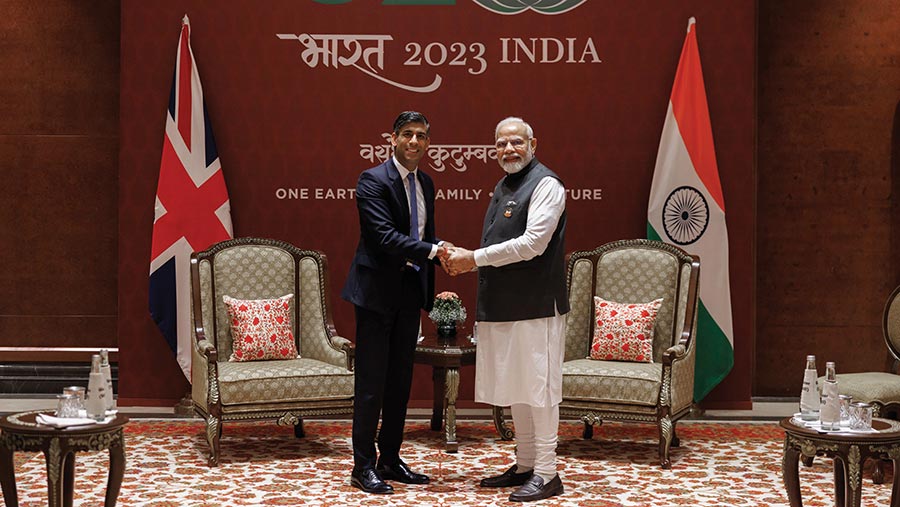‘Progress’ on India trade deal threatens high UK food standards
 Prime minister Rishi Sunak meets his Indian counterpart Narendra Modi in New Delhi © PA Images/Alamy
Prime minister Rishi Sunak meets his Indian counterpart Narendra Modi in New Delhi © PA Images/Alamy A free-trade deal with India threatens to undermine the high food and farming standards of UK agriculture and expose British farmers and consumers to cheap food imports, warn farm leaders.
Several UK food and farming organisations, including the NFU, Sustain: The Alliance for Better Food and Farming, and the Tenant Farmers Association (TFA) have voiced concerns about the impact of a free-trade agreement (FTA) on UK agriculture.
The UK government is seeking to negotiate an FTA and double the value of UK-India trade by 2030.
See also: Analysis: 7 years after Brexit, farmers count the cost
However, the government’s own impact assessment has shown an FTA with India will result in a fall of around £10m in agricultural output.
Prime minister Rishi Sunak is visiting India for the G20 Summit and told reporters this week the UK and India had made “enormous progress” towards signing a deal.
“I think there is an enormous opportunity for both India and the UK to strengthen our economic co-operation which will bring real benefits to our citizens in both countries,” Mr Sunak added.
Talks between the two countries have reached round 13 and several chapters have been closed, but it remains uncertain whether a deal can be struck in 2023.
Sustain published a report last month warning the India trade deal “could bring a spike in toxic pesticides in food”.
The report, which was written jointly with the Pesticides Action Network (PAN) UK and PAN India, warned that the new agreement looked likely to see a significant increase in food exports to the UK of staples produced with illegally high levels of pesticides, such as rice, wheat and tea.
India allows wheat to contain 50 times the amount of chlorpyrifos permissible in the UK and foods such as apples and grapes can contain 200 times the levels of insecticide Malathion, which has been linked to cancer, infertility and birth defects, the report states.
Vicki Hird, head of Sustain, told Farmers Weekly she was concerned the FTA would see British farmers competing with Indian farmers producing food more cheaply using toxic pesticides that are banned in the UK.
She also expressed concern the Trade and Agriculture Commission (TAC) had not been mandated to scrutinise “such a complex deal” and that parliamentarians would not be allowed to vote on it.
In July, the NFU raised concerns that India, a major global sugar producer, could be granted preferential terms on sugar trade under the FTA, affecting UK beet growers.
